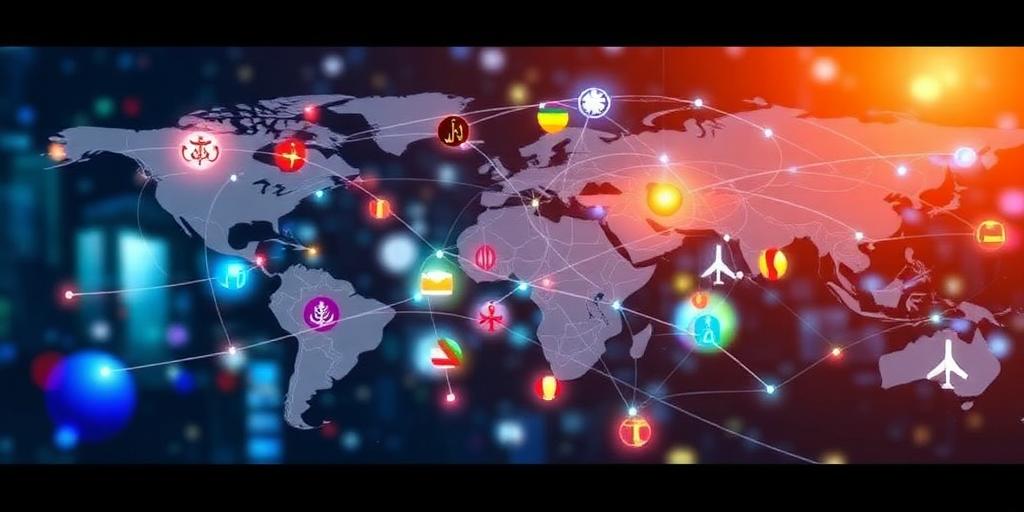How Globalization Is Reshaping Religious Identity
Globalization, the ever-increasing interconnectedness of nations through trade, technology, and cultural exchange, is not merely an economic or political phenomenon. It profoundly impacts the very fabric of human societies, including religious identity. This article delves into the multifaceted ways globalization reshapes religious beliefs, practices, and affiliations in the modern world.
The Dual Nature of Globalization's Impact
Globalization's influence on religious identity is complex, often exhibiting a dual nature:
- Homogenization vs. Heterogenization: On one hand, globalization can lead to the homogenization of culture, where dominant cultural forms spread and potentially dilute local religious traditions. On the other hand, it can also foster heterogenization, as exposure to diverse religious beliefs leads to new interpretations, syncretism, and the emergence of hybrid religious identities.
- Universalism vs. Particularism: Globalization promotes a sense of global citizenship and universal values, which can resonate with some religious adherents. Simultaneously, it can also trigger a resurgence of particularistic religious identities, as people seek to reaffirm their unique cultural and religious heritage in the face of perceived cultural threats.
- Standardization vs. Fragmentation: Globalization sometimes encourages standardization of religious practices to appeal to a global audience. However, the phenomenon can also lead to fragmentation as individuals cherry-pick and blend elements from different traditions, creating personalized belief systems.
Mechanisms of Transformation
Several key mechanisms drive globalization's impact on religious identity:
- Increased Mobility: Migration and tourism expose individuals to different religions, fostering interfaith dialogue, understanding, and, in some cases, conversion. The ease of travel allows religious leaders and missionaries to spread their teachings across geographical boundaries.
- Digital Connectivity: The Internet and social media platforms serve as powerful tools for religious communities to connect, share information, and build global networks. They also enable individuals to explore different religions and engage in online religious practices.
- Economic Integration: Global capitalism can challenge traditional religious values and norms, as consumerism and materialism become increasingly pervasive. However, it also provides opportunities for religious organizations to engage in social enterprises and development projects.
- Cultural Exchange: The flow of cultural products, such as movies, music, and literature, can influence religious beliefs and practices. It can also create opportunities for interfaith dialogue and cultural understanding.
Case Studies: Examples from Around the World
- Islam in Europe: Globalization has led to the growth of Muslim communities in Europe, creating new challenges and opportunities for integration and interfaith dialogue. The rise of Islamophobia and extremist groups has further complicated the relationship between Islam and European societies.
- Buddhism in the West: Westerners' interest in Buddhism has grown, leading to the establishment of numerous Buddhist centers and meditation groups. Western practitioners often adapt Buddhist teachings to fit their cultural context, creating unique forms of Western Buddhism.
- Hinduism in the Diaspora: Hindu communities have spread across the globe, maintaining their religious traditions while adapting to new cultural environments. The Internet and social media play a vital role in connecting the Hindu diaspora and preserving their cultural heritage.
Challenges and Opportunities
Globalization presents both challenges and opportunities for religious communities:
- Challenges: Religious communities may face challenges adapting to changing social and cultural norms. They may also encounter resistance from those who fear the loss of traditional values. Globalization can also exacerbate religious tensions and conflicts, as different groups compete for power and resources.
- Opportunities: Globalization provides religious communities with new opportunities to connect with people from different backgrounds, share their teachings, and engage in social justice and development work. It also allows them to adapt and evolve in response to changing circumstances.
Conclusion
Globalization is a transformative force that profoundly impacts religious identity. It creates new opportunities for interfaith dialogue, cultural exchange, and religious innovation, but it also poses challenges to traditional beliefs and practices. Understanding the complex relationship between globalization and religion is essential for navigating the challenges and opportunities of the 21st century. As the world becomes increasingly interconnected, religious communities must adapt and evolve to remain relevant and meaningful in the lives of their adherents.









